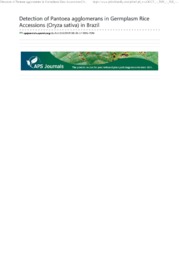Detection of Pantoea agglomerans in germplasm rice accessions (Oryza sativa) in Brazil.
Detection of Pantoea agglomerans in germplasm rice accessions (Oryza sativa) in Brazil.
Author(s): CARRER FILHO, R.; RODRIGUES, L. L.; ABREU, A. G.; SOUZA, R. R.; RANGEL, P. H. N.; MELLO, R. N. de; ROCHA, G. A.; CUNHA, M. G.
Summary: The cultivated area devoted to rice crops (Oryza sativa) in Brazil has expanded in recent years, along with improvements in yield. This has prompted the continuous exchange of material from active germplasm banks between government breeding programs. When placed in a greenhouse for multiplication purposes, rice accessions resulting from exchanges between USDA-ARS (United States Department of Agriculture - Agricultural Research Service) showed little or no germination. The accessions were sent to the tissue culture laboratory of BAG-CNPAF (Embrapa National Rice and Bean Research Center) to recover embryos by aseptically removing the seed coat of 10 seeds from each accession. Bacterial colony growth concomitant to germination inhibition was observed in some accessions, from which four bacterial isolates were obtained.
Publication year: 2018
Types of publication: Journal article
Unit: Embrapa Rice & Beans
Keywords: Arroz, Banco de Germoplasma, Germplasm conservation, Pantoea agglomerans, Rice
Observation
Some of Embrapa's publications are published as ePub files. To read them, use or download one of the following free software options to your computer or mobile device. Android: Google Play Books; IOS: iBooks; Windows and Linux: Calibre.
Access other publications
Access the Agricultural Research Database (BDPA) to consult Embrapa's full library collection and records.
Visit Embrapa Bookstore to purchase books and other publications sold by Embrapa.

